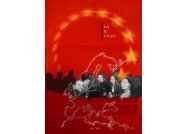turkish-greek civic dialogue - AEGEE Europe
turkish-greek civic dialogue - AEGEE Europe
turkish-greek civic dialogue - AEGEE Europe
Create successful ePaper yourself
Turn your PDF publications into a flip-book with our unique Google optimized e-Paper software.
Foundation simultaneously and the shared language of peace was emphasised<br />
in all publications like symposium posters and program leaflets.”<br />
“This Project is just a first step towards removing prejudices and improving<br />
mutual understanding between the Turkish and Greek youth. Needless to say,<br />
the challenge is considerable and overcoming all of the obstacles is beyond<br />
the capacity of one Civic Dialogue Project. Nonetheless, the most important<br />
message that has emerged today out of this endeavour is the fact that such<br />
projects will operate as the building blocks of a structure that would carry the<br />
hope of peace and <strong>dialogue</strong> into the future. Once again, the youth are our<br />
building blocks in this attempt and it has been such a wise choice to strengthen<br />
the <strong>dialogue</strong> by engaging our young friends. Therefore, it is fundamentally<br />
important to revitalise today’s environment of discussion and <strong>dialogue</strong> in the<br />
future and to design new venues and activities that would raise the bar. I<br />
would like to affirm that The Foundation of Lausanne Treaty Emigrants is ready<br />
for such a challenge and more than willing to put all of its resources into the<br />
realisation of such aims. We are most certainly looking forward to be involved<br />
in the future projects as a partner and to work with <strong>AEGEE</strong>-Ankara or any<br />
other organisation that would contribute in improving the Turkish-Greek Civic<br />
Dialogue.”<br />
Greek-Turkish cooperation:<br />
CONSTRAINTS AND PERSPECTIVES<br />
.......................................................................................... Konstantinos Tsitselikis *<br />
“After having participated in the conference on the Population Exchange<br />
organised last November 2003 within the framework of <strong>AEGEE</strong> Project “Turkish-<br />
Greek Civic Dialogue”, I would like to highlight certain thoughts on the Greek-<br />
Turkish fields of cooperation and its perspectives.<br />
Organising a conference sometimes seems to be a feasible, even laborious task.<br />
* Secretary administrative of the Research Center for Minority Groups, [KEMO: www.kemo.gr]<br />
Assistant professor at the University of Macedonia, Thessaloniki, Greece<br />
Association des Etats Généraux des Etudiants de L’<strong>Europe</strong><br />
Some other times it seems to be out of the question. Of course, in the case of<br />
the population exchange, the issue has much more connotations than talking<br />
about earthquakes, trade or food and music. I know about a few books and<br />
conferences dealing with the Population Exchange, which all were surrounding<br />
the same idea so far: the unilateral dimension of history or the separation of<br />
the world into two absolutely distinctive black and white spheres. The main<br />
discourse deals only with the victimisation exclusively of our own ancestors.<br />
What about the others? They simply do not exist. No conference held by a<br />
Turkish or Greek organisation till last November did examine the issue under a<br />
global and objective perspective, under the fundamental principle of scientific<br />
research.<br />
In my opinion, scientific research conducted by Greek and Turk scholars could<br />
build a bridge of cooperation on a solid basis. This solid basis would be the<br />
demystification of a series of myths, which create political antagonisms at<br />
three levels: first, between governments, second between economical interests<br />
and third among citizens entrapped by the dogmatic national ideology.<br />
Why do we need to cooperate in the field of social sciences? How we have<br />
to define this cooperation? What are the constraints of such process? Who<br />
should be the main actors? Is <strong>Europe</strong> a secure path for the consolidation of<br />
this mutual understanding? Who is supposed to be the actor of the seeking<br />
cooperation? The governments possess the power to do so and they bear for<br />
sure a very important responsibility in creating such a climate of friendship,<br />
but I guess that they are not reliable for enhancing a real <strong>dialogue</strong>: after all<br />
they serve only high-rated political and economical interests. The civil society,<br />
the citizens are only very lately starting acting towards the creation of an<br />
independent bridge of cooperation. The civil <strong>dialogue</strong>, in our case sponsored<br />
by the <strong>Europe</strong>an Union, seems to be by far more reliable by the relevant efforts<br />
made by the governments. A medium way of cooperation is undertaken by the<br />
economical interests. But still, all these actors are not freed by the essence<br />
of the problem which according to my opinion is not any other but national<br />
ideology. Here I would like to give you an example from the world of economy.<br />
You know when you export Turkish goods in Greece is very difficult to sell if<br />
there is an indication “Made in Turkey”, even if the price and quality is good.<br />
What stops a Greek customer to buy Turkish? Ideology forms behaviours, which<br />
are very often contrary to the personal interests. Governments, businessmen<br />
and citizens are the potential actors for the Greek-Turkish cooperation and<br />
<strong>dialogue</strong>, which are closely interrelated and interdependent to each other.<br />
Final Conference<br />
171







